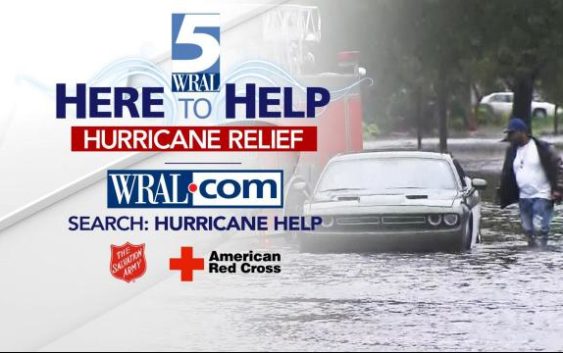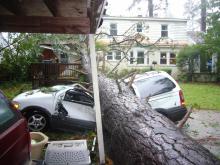- Houston Cougars take on A&M Aggies in charity exhibition game supporting Hurricane Beryl relief
- Hurricane Helene donations delivered to Avery County for Share the Warmth campaign
- Old Crow Medicine Show founder talks music, hurricane relief and this weekend's big benefit show
- IV fluid shortage caused by hurricane to last for months
- 'It financially annihilated us': Pregnant mother displaced for 2nd time after western NC floods
Get help, give help: Recovering after Hurricane Florence

North Carolina’s long Atlantic coast has a history of weathering and withstanding hurricanes, but high winds and storm surge can do damage even inland when the conditions are right. After the storm, it is natural to want to help our neighbors. Whether you need help or want to give help, this is your guide.
Give help after a hurricane
DONATE TO HELP OTHERS
A WRAL phone bank raised $713,492 for Hurricane Florence relief. Thank you for your generosity.
Financial donations can still be made to any of our charitable partners: Red Cross, Salvation Army, NC Disaster Relief Fund and Food Bank of Central & Eastern NC.
Donations – by credit card, check or cash – are always the most efficient way to make sure that relief agencies on the scene of a crisis are able to purchase and distribute any necessary items.
The American Red Cross has 800 volunteers in locations throughout the state. Your Red Cross donations support those relief efforts.
The N.C. Disaster Relief Fund is currently accepting contributions for Hurricane Florence damage. Contributions are distributed by the United Way of North Carolina and directly help Hurricane Florence victims.
If you are unable to give online, you may mail your contribution to:
North Carolina Disaster Relief Fund
20312 Mail Service Center
Raleigh, NC 27699
To contribute to the Salvation Army’s Florence disaster relief efforts, visit www.HelpSalvationArmy.org or call 1-800-SAL-ARMY.
The Salvation Army does not place an administrative fee on disaster donations. During emergency disasters, 100 percent of designated gifts are used to support specific relief efforts.
North Carolina Community Foundation Disaster Relief Fund has allocated $1 million for the initial round of grants to support long-term recovery from Hurricane Florence.
The N.C. Community Foundation Disaster Relief Fund will support nonprofits with programs that help hurricane victims in our state. All funds raised for the NCCF Disaster Relief Fund will go directly to nonprofit organizations serving the needs of local individuals and communities in the impacted areas of North Carolina. No portion of the funds raised will be used for the Foundation’s administrative or operational expenses. The Foundation will also encourage this practice among local recipient agencies.
Donations can be made online through the NCCF website at nccommunityfoundation.org via the “Give Now” button.
Checks can be mailed to:
NCCF
3737 Glenwood Ave. Suite 460
Raleigh, NC 27612.
Please designate your gift for “Disaster Relief” or include a contribution form available on the NCCF website under the “Giving” tab.
Please call 919-828-4387 or 800-532-1349 if you need assistance with donations. All gifts are tax-deductible.
Samaritan’s Purse, the international aid group run by the Billy Graham Evangelistic Association, has established bases in New Bern, Jacksonville, and Wilmington, homeowners in Jesus’ Name by clearing debris, doing chainsaw work, tarping roofs, and mudding out flooded houses. You can donate online to those efforts.
VOLUNTEER YOUR TIME
The Red Cross is always a trustworthy and reliable way give your time and talents to help your neighbors.
Licensed nurses and mental health professionals are encouraged to volunteer with Red Cross in the local community.
Following sign-up, a Red Cross team member will contact applicants directly.
N.C. Baptists On Mission (NCBM) is preparing to respond to needs after Hurricane Florence makes landfall. It is very likely that volunteers will be needed to clean up for many weeks (or months) to come. Those available to help can register their skills for an assignment.
HELP THE PETS STRANDED BY THE STORM
Tara Lynn, from the SPCA of Wake County, says money is what rescue groups really need to keep saving animals abandoned when their owners sought shelter or rescued as the waters rose.
The SPCA has a national relief partnership with pet food manufacturers, so plenty of food will reach animals in need, and donated food becomes a burden for relief workers to try to store and use before it goes bad.
The SPCA is using monetary donations to pay for needs like the gas to transport animals to safety, and for medicines and vaccines to treat them while they are in shelters.
Get help after a hurricane
REQUEST DISASTER ASSISTANCE
Those in need of assistance can call 800-621-3362 from 7 a.m. until 11 p.m. (local time) seven days a week or visit DisasterAssistance.gov, enter their home address and find out if the area where they live has been declared for individual assistance.
Disaster assistance is available to affected individuals in Beaufort, Bladen, Brunswick, Carteret, Columbus, Craven, Cumberland, Duplin, Harnett, Lenoir, Jones, New Hanover, Onslow, Pamlico, Pender, Robeson, Sampson, and Wayne counties. Additional counties may be added later.
To apply for assistance, you will need:
- Social Security Number
- Daytime telephone number
- Current mailing address and address and zip code of the damaged property
- Insurance information, if available.
At Disaster Recovery Centers, storm survivors can meet face-to-face with representatives from North Carolina Emergency Management, Federal Emergency Management Agency, U.S. Small Business Administration, volunteer groups and other agencies for aid including:
- Guidance about disaster recovery and eligibility;
- Assistance applying;
- Application status updates;
- Clarification of any written correspondence received;
- Housing assistance and rental resource information;
- Referrals to other agencies and state programs that may provide further assistance;
- Information about disaster-related funeral and other needs assistance;
- Information about low-interest disaster loans.
The United Way has set up a Hurricane Florence assistance hotline. Dial 211 to speak with a trained call specialist; the service is free, confidential and available in any language.
Dialing 211 will connect callers with direct access to all county programs, shelter information, evacuation information and emergency relief programs. Redundant 211 call-center staff in multiple states not affected by Florence during the storm and its aftermath will ensure zero downtime throughout.
United Way Worldwide has also established a text-to-chat line. Simply text FLORENCE to 898211 to get instant hurricane resources and information as well as future text updates as the storm progresses.
FILE AN INSURANCE CLAIM
Most North Carolina homes are required to carry flood insurance, an addendum not covered by most standard homeowners’ policies, and policies must be in place 30 days before a storm to pay out.
If you have a homeowner’s or flood insurance policy, file your insurance claim immediately before applying for disaster assistance. Get the process started quickly. The faster you file, the faster your recovery can begin.
- Contact your insurance agent as quickly as possible and ask for instructions on what to do until the adjuster arrives.
- Prepare an inventory of personal property that has been damaged or destroyed; take pictures of the damaged property.
- Keep all receipts. Reasonable expenses to protect your property are part of the loss and are generally reimbursed by insurance companies.
- Do not have permanent repairs made until your insurance company has inspected the property and you have reached an agreement on the cost of repairs.
- If your home is uninhabitable, most homeowner’s policies pay additional living expenses while your property is being repaired. Before renting temporary housing, check with your insurance company or agent to determine what expenses will be reimbursed.
- Review the settlement steps outlined in your policy. If you are dissatisfied with the proposed settlement offer, explain your position. If there is a significant difference between what the insurance company offers and what you believe you are entitled to, you may wish to submit the dispute to arbitration.
If you have questions about the insurance claims process or need assistance, you can call the Consumer Services Division of the N.C. Department of Insurance at 855-408-1212.
REPLACE IMPORTANT DOCUMENTS
Events such as the flooding caused by hurricanes commonly result in the loss of important documents. North Carolinians can use the following resources to replace lost or damaged documents and records.
Contact your county Department of Social Services: 866-719-0141
Replace your EBT card: 888-622-7328
Order new birth and death certificates: 919-733-3000
Replace a lost driver’s license
Replace vehicle titles: 919-715-7000
Replace a Social Security card
Replace a Medicare card: 800-772-1213
Replace a Green Card: 800-375-5283
Replace a U.S. Passport: 877-487-2778
Request military service records
FEMA HOUSING ASSISTANCE
FEMA is working closely with individual aid applicants to tailor housing solutions. Manufactured homes are only one option, and they are only utilized when all other options have been exhausted.
There are several stages in the process before a household will be offered a manufactured housing unit.
Registration and Inspection
Applicants register with FEMA. During the registration process, applicants provide FEMA with initial information about the impact of the disaster on their property and their current housing status. The applicant’s damaged dwelling is visited by an inspector and levels of damage are recorded.
Financial housing assistance
A determination of eligibility for FEMA financial housing assistance is made based on the inspector’s report. Eligible displaced households who do not have insurance to cover their temporary housing requirement are provided with rental assistance.
Direct housing eligibility determination
When there are not enough available rental resources within a reasonable commuting distance, FEMA will look at the need to conduct a Direct Housing Assessment.
Based on the results of the Direct Housing Assessment FEMA can authorize Direct Temporary Housing Assistance in the form of Manufactured Housing Units (MHUs), at the request of the state.
Criteria for Direct Housing is based on the recorded level of damage to the home, the expected duration of displacement and other factors. Households who meet the criteria are contacted by a FEMA applicant services specialist to discuss the current status of their housing plan and eligibility for a FEMA manufactured home.
If a manufactured home is identified as the right solution, the placement process takes time. The timeframe will vary for each individual applicant, as every situation is different.
Pre-disaster homeowners will be offered an option to place a unit on their property; FEMA will also lease pads on commercial parks where available for eligible renters and owners with infeasible sites.FEMA Housing Assistance, both financial and direct, can be provided for up 18 months for survivors with a continuing need and in adherence to continuing eligibility requirements.

